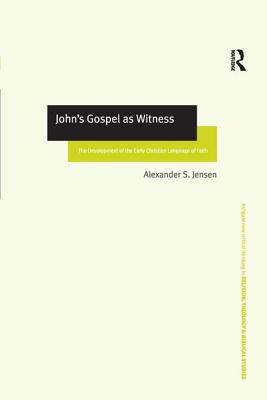
Door een staking bij bpost kan je online bestelling op dit moment iets langer onderweg zijn dan voorzien. Dringend iets nodig? Onze winkels ontvangen jou met open armen!
- Afhalen na 1 uur in een winkel met voorraad
- Gratis thuislevering in België vanaf € 30
- Ruim aanbod met 7 miljoen producten
Door een staking bij bpost kan je online bestelling op dit moment iets langer onderweg zijn dan voorzien. Dringend iets nodig? Onze winkels ontvangen jou met open armen!
- Afhalen na 1 uur in een winkel met voorraad
- Gratis thuislevering in België vanaf € 30
- Ruim aanbod met 7 miljoen producten
Zoeken
John's Gospel as Witness
The Development of the Early Christian Language of Faith
Alexander S Jensen
€ 182,45
+ 364 punten
Uitvoering
Omschrijving
This book defends the claims of historical-critical research into the New Testament as necessary for theological interpretation. Presenting an interdisciplinary study about the nature of theological language, this book considers the modern debate in theological hermeneutics beginning with the Barth-Bultmann debate and moving towards a theory of language which brings together historical-critical and theological interpretation. These insights are then applied to the exegesis of theologically significant texts of the Gospel of John in the light of the hermeneutical discussion. Drawing together the German and Anglo-American hermeneutical traditions, and discussing issues related to postmodern hermeneutical theories, this book develops a view of the New Testament as the reflection of a struggle for language in which the early Church worked to bring about a language through which the new faith could be understood.
Specificaties
Betrokkenen
- Auteur(s):
- Uitgeverij:
Inhoud
- Aantal bladzijden:
- 173
- Taal:
- Engels
- Reeks:
Eigenschappen
- Productcode (EAN):
- 9780754635468
- Verschijningsdatum:
- 28/02/2004
- Uitvoering:
- Hardcover
- Formaat:
- Genaaid
- Afmetingen:
- 156 mm x 234 mm
- Gewicht:
- 408 g

Alleen bij Standaard Boekhandel
+ 364 punten op je klantenkaart van Standaard Boekhandel
Beoordelingen
We publiceren alleen reviews die voldoen aan de voorwaarden voor reviews. Bekijk onze voorwaarden voor reviews.











